- Home
- L. M. Montgomery
Mistress Pat Page 3
Mistress Pat Read online
Page 3
Cuddles shook a golden-brown head.
“I’d love to go but you know I twisted my foot this morning and it hurts me yet. I’m going over to sit on Weeping Willy’s slab in the graveyard for a while and just dream. I feel shimmery today…as if I was made of sunbeams.”
When Cuddles said things like that Pat had a vague feeling that Cuddles was clever and ought to be educated if it could be managed. But it had to be admitted that so far Cuddles seemed to share the family indifference to education. She went in unashamedly for “a good time” and pounced on life like a cat on a mouse.
Pat slipped away for one of her dear pilgrimages to the Secret Field…that little tree-encircled spot at the very back of the farm, which she and Sid had discovered so long ago and which she, at least, had loved ever since. Almost every Sunday evening, when they walked over the farm, talking and planning…for Sid was developing into an enthusiastic farmer…they ended up with the Secret Field, which was always in grass and always bore a wonderful crop of wild strawberries. Sid had promised her he would never plough it up. It was really too small to be worthwhile cultivating anyhow. And if it were ploughed up there might never be any more of Judy’s famous wild strawberry shortcakes or those still more delicious things Pat made and which she called strawberry cream pies.
It was nice to go there with Sid but it was even nicer to go alone. There was nothing then to come between her and the silent, rapt communion she seemed to hold with it. It was the loneliest and loveliest spot on the farm. Its very silence was friendly and seemed to come out of the woods around it like a real presence. No wind ever blew there and rain and snow fell lightly. In summer it was a pool of sunlight, in winter a pool of frost…now in autumn a pool of color. Musky, spicy shadows seemed to hover around its gray old fences. Pat always felt that the field knew it was beautiful and was happy in its knowledge. She lingered in it until the sun set and then went slowly back home, savoring every moment of the gathering dusk. What a lovely phrase “gathering dusk” was…almost as lovely as Judy’s “dim”, though the latter had a certain eerie quality that always gave Pat a rapture.
At the top of the hill field she paused, as always, to gloat over Silver Bush. The light shone out from the door and windows of the kitchen where Judy would be preparing supper, with the cats watching for a “liddle bite” and McGinty cocking a pointed ear for Pat’s footstep. Would it be as nice when that unknown creature, the all-too-necessary hired man, would be hanging round, waiting for his supper? Of course it wouldn’t. He would be a stranger and an alien. Pat fiercely resented the thought of him.
They would have supper by lamplight now. For a while she always hated to have to light the lamp for supper…it meant that the wind had blown the summer away and that winter nights were closing in. Then she liked it…it was so cozy and companionable and Silver Bushish, with Judy’s “dim” looking in through the crimson vines around the window.
The color of home on an autumn dusk was an exquisite thing. The trees all around it seemed to love it. The house belonged to them and to the garden and the green hill and the orchard and they to it. You couldn’t separate them, Pat felt. She always wondered how anyone could live in a house where there were no trees. It seemed an indecency, like a too naked body. Trees…to veil and caress and beshadow…trees to warn you back and beckon you on. Lombardies for stateliness…birches for maiden grace…maples for friendliness…spruce and fir for mystery…poplars to whisper secrets. Only they never really did. You thought you understood as long as you listened…but when you left them you realized they had just been laughing at you…thin, rustling, silky laughter. All the trees kept some secret. Who knew but that all those white birches, which stood so primly all day, when night and moonlight came, might step daintily out of the earth and pirouette over the meadows, while the young spruces around the Mince Pie Field danced a saraband? Laughing at her fancy, Pat ran into the light and good cheer of Judy’s white-washed kitchen with life singing in her heart.
CHAPTER 3
“Tillytuck! Did ye iver be hearing the like av that for a name?” said Judy, quite flabbergasted for once. “Niver have I heard such a name on the Island before.”
“He’s been working on the south shore for years but he really belongs to Nova Scotia, dad says,” said Cuddles.
“Oh, oh, that ixplains it. Minny a quare name I’ve known coming out av Novy Scoshy. And what will we be after calling him? If he’s a young chap we can be calling him be his given name if he do be having one but if he’s a bit oldish it’ll have to be Mr. Tillytuck, since hired hilp is getting so uppish these days, and it’ll be the death av me if I do have to be saying ‘Mr. Tillytuck’ ivery time I open me mouth. Mister Tillytuck!”
Judy savored the absurdity of it.
“He’s quite old, dad says. Over fifty,” remarked Cuddles. “And dad says, too, that he’s a bit peculiar.”
“Peculiar, is it, thin? Oh, oh, people do be saying that I’m a bit that way mesilf, so there’ll be a pair av us. Is he peculiar in being worth his salt in the way av work? That do be the question.”
“He comes well recommended and dad was almost in despair of getting any one half suitable.”
“And is Mister Tillytuck married, I’m asking. Mistress Tillytuck! Oh, oh.”
“Dad didn’t say. But he’s to be here tomorrow so we’ll find out all about him. Judy, what have you got in that pot?”
“A bit av soup lift over from dinner. I did be thinking we’d like a liddle sup av it be bedtime. And lave a drop in the pot for Siddy. He’s gone gallivanting and it’s a cold night and mebbe a long drive home.”
There was no trace of disdain in Judy’s “gallivanting.” Judy thought gallivanting one of the lawful delights of youth.
It was a wild wet November evening, with an occasional vicious swish of rain on the windows. But the fire glowed brightly: Gentleman Tom was curled up on his own prescriptive chair and McGinty slumbered on the rug; Bold-and-Bad on one side of the stove, and Squedunk, a half-grown, striped cat on his promotion, on the other, kept up a lovely chorus of purrs: and Cuddles had a cherry-red dress on that brought out the young sheen of her hair. Cuddles had such lovely hair, Pat thought proudly. Nothing so pallid and washed out as gold, like Dot Robinson’s…no, a warm golden brown.
Judy’s soup had a very tempting aroma. Judy was past-mistress of the art of soup-making. Long Alec always said all she had to do was wave her hand over the pot. Mother was mending by the table. Mother had never been strong since her operation and Pat, who watched her with a jealous love, thought she ought to be resting. But mother always liked to do the mending.
“It will be the last thing I’ll give up, Pat. Most women don’t like mending. I always did. The little worn garments…when you were children…they seemed so much a part of you. And now your bits of silk things. It doesn’t hurt me really. I like to think I’m a little use still.”
“Mother! Don’t you dare say anything like that again! You’re the very heart and soul of Silver Bush…you know you are. We couldn’t do without you for a day.”
Mother smiled…that little slow, sweet, mysterious smile of mothers…the smile of a woman very wise and very loving. But then everything about mother was wise and loving. When shrieks of laughter rang out she looked as if she were laughing, too, though mother never did laugh…not really.
“Let’s have a jolly evening,” Cuddles had said. “If this Tillytuck creature doesn’t like staying in the granary loft in the evenings this may be the last evening we’ll have the kitchen to ourselves, so let’s make the most of it. Tell us some stories, Judy…and I’ll roast some clove apples.”
“‘Pile high the logs, the wind blows chill,’” quoted Pat. “At least put a few more sticks in the stove. That doesn’t sound half as romantic as piling high the logs, does it?”
“I’m thinking it might be more comfortable if it isn’t be way av being romantic,” said Judy, sitti
ng down to her knitting in a corner whence she could give the soup pot an occasional magic stir. “They did be piling the logs in Castle McDermott minny the time and we’d have our faces frying and the backs av us frazing. Oh, oh, give me the modern ways ivery time.”
“It seems funny to think of fires in heaven,” ruminated Pat, curling up Turk-fashion on the old hooked rug before the stove, with its pattern of three rather threadbare black cats. “But I want a fire there once in a while…and a nice howly, windy night like this to point the contrast. And now for your ghost story, Judy.”
“I’m clane run out av ghosts,” complained Judy…who had been saying the same thing for years. But she always produced or invented a new one, telling it with such verisimilitude of detail that even Pat and Cuddles were…sometimes…convinced. You could no longer believe in fairies of course, but the world hadn’t quite given up all faith in ghosts. “Howsiver, whin I come to think av it, I may niver have told ye av the night me own great-uncle saw the Ould Ould McDermott…the grandfather of the Ould McDermott av me own time…a-sitting on his own grave and talking away to himsilf, angry-like. Did I now?”
“No…no…go on,” said Cuddles eagerly.
But the ghost story of the Ould Ould McDermott was fated never to be told for at that moment there came a resounding treble knock upon the kitchen door. Before one of the paralyzed trio could stir the door was opened and Tillytuck walked into the room…and, though nobody just then realized it, into the life and heart of Silver Bush. They knew he was Tillytuck because he could be nobody else in the world.
Tillytuck came in and shut the door behind him but not before a lank, smooth-haired black dog had slipped in beside him. McGinty sat up and looked at him and the strange dog sat down and looked at McGinty. But the Silver Bush trio had no eyes just then for anybody but Tillytuck. They stared at him as if hypnotized.
Tillytuck was short and almost as broad as he was long. His red face was almost square, made squarer, if possible, by a pair of old-fashioned mutton-chop whiskers of a faded ginger hue. His mouth was nothing but a wide slit and his nose the merest round button of a nose. His hair could not be seen for it was concealed under a mangy old fur cap. His body was encased in a faded overcoat and a rather gorgeous tartan scarf was wrapped around his neck. In one hand he carried a huge, bulging old Gladstone bag and in the other what was evidently a fiddle done up in a flannel case.
Tillytuck stood and looked at the three wimmen critters out of twinkling little black eyes almost buried in cushions of fat.
“How pleased ye look to see me!” he said. “Only sorter paralyzed as it were. Well, I can’t help being good-looking.”
He went into what seemed an internal convulsion of silent chuckles. Pat jerked herself out of her trance. Mother had gone upstairs…somebody must do…say…something. Judy, probably for the first time in her life, seemed incapable of speech or movement.
Pat scrambled up from the rug and went forward.
“Mr.…Mr. Tillytuck, is it?”
“The same, at your service…Christian name, Josiah,” said the newcomer, with a bow that might have been courtly if he had had any neck to speak of. It was not till afterwards that Pat thought what a nice voice he had. “Age, fifty-five…in politics, Liberal…religion, fundamentalist…gentleman-at-large, symbolically speaking. And an Orangeman,” he added, looking at a large picture of King William on a white horse, crossing the Boyne, that hung upon the wall.
“Won’t you…take off your coat…and sit down?” said Pat rather stupidly. “You see…we didn’t expect you tonight. Father told us you would be here tomorrow.”
“I got a chance up on a truck to Silverbridge so I thought I’d better take it,” rumbled Mr. Tillytuck. He hung his cap up on a nail, revealing a head thatched with thick pepper-and-salt curls. He took off his scarf and coat and the cause of a mysterious bulge at one side was explained…a huge, stuffed, white Arctic owl which he proudly set up on the clock shelf. He put his bag in one corner with his fiddle on top of it. Then, with unerring discrimination, he selected the most comfortable chair in the kitchen…Great-grandfather Nehemiah Gardiner’s old glossy wooden arm-chair with its red cushions…sank into it and produced a stubby black pipe from his pocket.
“Any objections?” he rumbled. “I never smoke if ladies object.”
“We don’t,” said Pat. “We’re used to Uncle Tom smoking.”
Mr. Tillytuck deliberately loaded and lighted his pipe. Ten minutes before no one in the room had ever seen him. And now he seemed to belong there…to have been always there. It was impossible to think of him as a stranger or a change. Even Judy, who, as a rule, didn’t care what any man thought of her clothes, was thanking her stars that she had on her new drugget dress and a white apron. McGinty had sniffed once at him approvingly and then gone to sleep again, ignoring the new dog entirely. The two gray cats went on purring. Only Gentleman Tom hadn’t yet made up his mind and continued to stare at him suspiciously.
Mr. Tillytuck’s body was almost as square as his face and was encased in a faded and rather ragged old gray sweater, revealing glimpses of a red flannel shirt which brought a sudden peculiar gleam into Judy’s eyes. It was so exactly the shade she would be wanting for the red rosebuds in the rug she meant to hook coming on spring.
“If ye’ve no objection to the pipe have ye any to the dog?” went on Mr. Tillytuck. “If ye haven’t maybe ye wouldn’t mind him lying down in that corner over there.”
Judy decided that it was time she asserted herself. After all, this was her kitchen, not Mister Tillytuck’s.
“Oh, oh, and is it a well-behaved dog he is, Mister Tillytuck, I’m asking ye.”
“He is,” replied Tillytuck solemnly. “But he’s been an unfortunate kind of dog…born to ill-luck as the sparks fly upward. Ye may not believe me, Miss…Miss…”
“Plum,” said Judy shortly.
“Miss Plum, that dog has had a hard life of it. He’s had mange and distemper once each and worms continual. He got run over by a truck last summer and poisoned by strychnine the summer before that.”
“He must have as many lives as a cat,” giggled Cuddles.
“He’s in good health now,” assured Mr. Tillytuck. “He’s a bit lame from cutting his foot with a sliver of broken glass last week but he’ll soon be over it. And he throws a fit once in a while…epileptic. Foams at the mouth. Staggers. Falls. In ten minutes gets up and trots away as good as new. So ye need never be worrying about him if ye see him take one. He’s really a broth of a dog, only kind of sensitive, and fine with the cows. I have a great respect for dogs…always touch my cap when I meet one.”
“What is his name?” asked Pat.
“I call him just Dog,” responded Mr. Tillytuck. And Just Dog he remained during his entire sojourn at Silver Bush.
“A bit too glib wid yer tongue, Mister Tillytuck,” thought Judy. But she only said,
“And what may yer mind be in regard to cats?”
“Oh,” said Mr. Tillytuck, who seemed quite contented with a whiff of his pipe between speeches, “I have a feeling for cats, Miss Plum. When I wandered in here the other morning I thought I’d like the people here because there was a cat on the windowsill. It’s a kind of instink with me. So thinks I to myself, ‘This place has got a flavor. I could do with a job here.’ And how right I was!”
“Where might your last place be?”
“On a fox farm down South Shore way. No names mentioned. I’ve been there three years. Got on well…liked it well…till the old missus died and the boss married again. I couldn’t pull with the new one at all. Everything on the table bought and only enough to keep the worms quiet at that. A terrible tetchie old woman. Ye couldn’t mention the weather to her but she’d quarrel with ye over it. Seemed to take it as a personal insult if you didn’t like the day. Then she picked on Dog right along. ‘Even a dog has some rights, woman,’ I told her. ‘You a
nd me ain’t going to click,’ I told her. ‘I’m rather finnicky as to the company I keep,’ I told her. ‘My dog is better company than a contentious woman,’ I told her. ‘I’m nobody’s slave,’ I told her…and give notice. When I can’t stay in a place without quarreling with the folks I just mosey along. Likely I’ll be here quite a while. Looks like a snug harbor to me. This arm-chair just fits my kinks. I’ve had my ups and downs. Escaped from the Titanic for one thing.”
“Oh!” Cuddles and Pat were all eyes and ears. This was exciting. Judy gave her soup a vicious swirl. Was she to have a rival in the story telling art?
“Yes, I escaped,” said Mr. Tillytuck, “by not sailing in her.” He put his pipe back into his mouth and emitted a rumble which they were to learn he called laughter.
“Oh, oh, so that do be your idea of a joke,” thought Judy. “I’m getting yer measure, Mister Tillytuck.”
“Not but what I’ve had my tragedies,” resumed Mr. Tillytuck. He rolled up his sweater sleeve and showed a long white scar on his sinewy arm. “A leopard gave me that when I was a tamer in a circus in the States in my young days. Ah, that was the exciting life. I have a peculiar power over animals. No animal,” said Mr. Tillytuck impressively, “can look me in the eye.”
“Oh, oh, and are ye married?” persisted Judy remorselessly.
“Not by a jugful!” exclaimed Mr. Tillytuck, so explosively that everyone jumped, even Gentleman Tom. Then he subsided into mildness again. “No, I’ve neither wife nor progeny, Miss Plum. I’ve often tried to get married but something always prevented. Sometimes everyone was willing but the girl herself. Sometimes nobody was willing. Sometimes I couldn’t get the question out. If I hadn’t been such a temperance man I might have been married many a time. Needed something to loosen my tongue.”
Mr. Tillytuck winked at Pat and Pat had a horrible urge to wink back at him. Really, some people did have a queer effect on you.

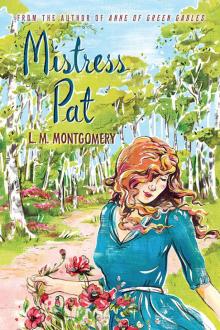 Mistress Pat
Mistress Pat A Tangled Web
A Tangled Web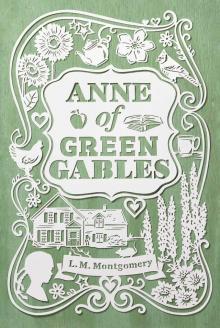 Anne of Green Gables
Anne of Green Gables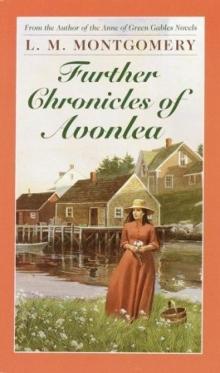 Further Chronicles of Avonlea
Further Chronicles of Avonlea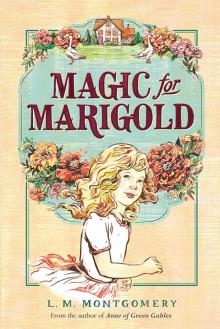 Magic for Marigold
Magic for Marigold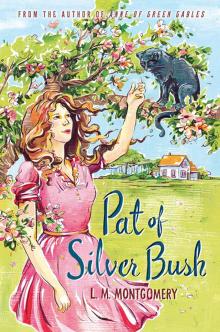 Pat of Silver Bush
Pat of Silver Bush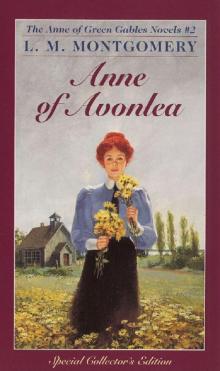 Anne of Avonlea
Anne of Avonlea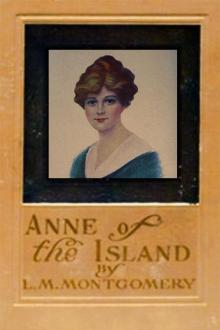 Anne of the Island
Anne of the Island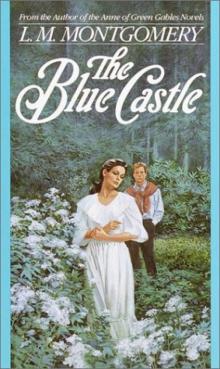 The Blue Castle
The Blue Castle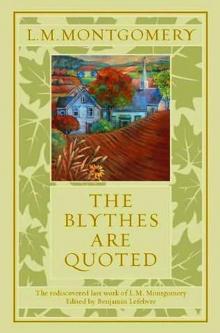 The Blythes Are Quoted
The Blythes Are Quoted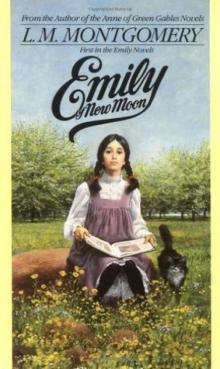 Emily of New Moon
Emily of New Moon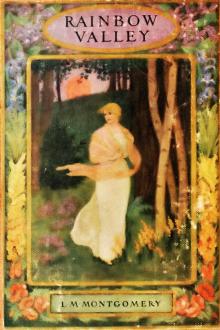 Rainbow Valley
Rainbow Valley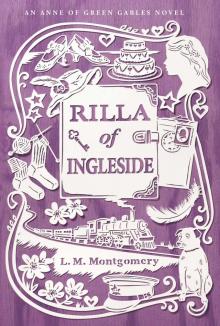 Rilla of Ingleside
Rilla of Ingleside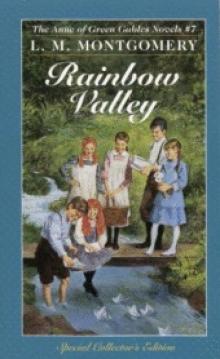 07 - Rainbow Valley
07 - Rainbow Valley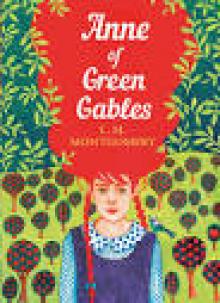 Anne of Green Gables (Penguin)
Anne of Green Gables (Penguin)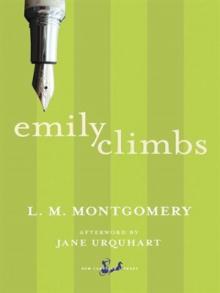 Emily Climbs
Emily Climbs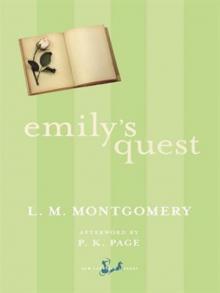 Emily's Quest
Emily's Quest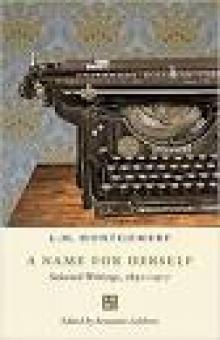 A Name for Herself
A Name for Herself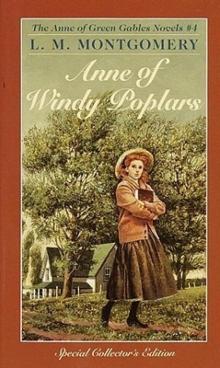 Anne of Windy Poplars
Anne of Windy Poplars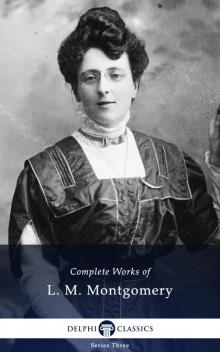 The Complete Works of L M Montgomery
The Complete Works of L M Montgomery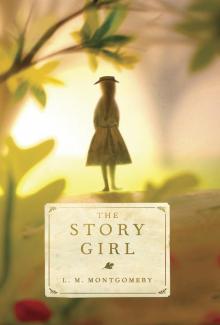 The Story Girl
The Story Girl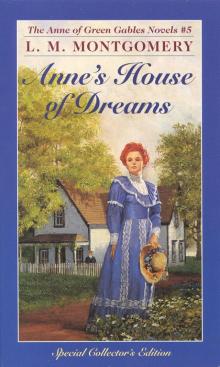 Anne's House of Dreams
Anne's House of Dreams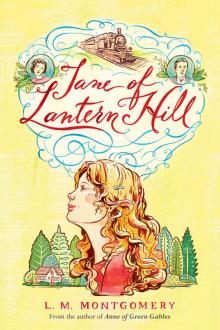 Jane of Lantern Hill
Jane of Lantern Hill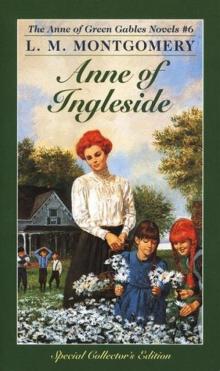 Anne of Ingleside
Anne of Ingleside